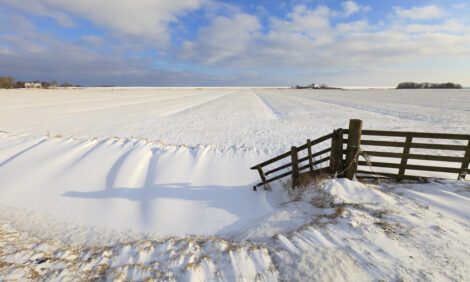



Quality of Data in Nordic Disease Registers for Dairy Cattle
All Scandinavian countries have a dairy cow registration, although monitoring illness is riddled with inaccuracies because human behaviour influences the number of reported cases, according to Mari Espetvedt from the Norwegian School of Veterinary Science.The number of disease events related to metabolism in dairy cattle that are reported to national registers in Denmark, Finland, Norway and Sweden varies and this impacts when comparing disease statistics between these countries.
Milk producers operate with different thresholds for contacting a veterinary surgeon when they detect mild cases of mastitis (inflammation of the udder) and this partly explains the previously documented variation in the occurrence of mastitis based on national registers. Norway’s register, the Norwegian Dairy Herd Recording System, has a high standard with regards to the transfer of data from dairy cattle records on the farms to the national register.

Denmark, Finland, Norway and Sweden all have national registration systems for dairy cattle, where various data are stored in central databases, including disease-related data. Such data are principally collected for use in health and production managementl, breeding and for the presentation of statistics.
At the same time, these data are potentially of great benefit to research. The comparison of disease occurence across national borders can also provide useful knowledge about how to reduce the amount of disease. For all these purposes, a high quality of data is required.
Evaluating data quality in registers is a demanding task. Very little documentation of such work existed before, and then only in a national setting. Mari Nicholls Espetvedt’s doctoral research is part of a larger Nordic project that has for the first time obtained measures of data quality that can reliably be compared across countries.
Her study also reveals how milk producers and veterinary surgeons influence how many cases of disease are registered. This provides useful information for those who use and administrate these registration systems in Nordic countries.
In 2008, Nordic milk producers registered all signs of illness they observed, irrespective of whether a veterinary surgeon had been contacted, and independently of the existing registration systems. The producer observations of metabolic diseases, were compared with data in the national registers. The proportion of observed disease events captured in the national registers varied from country to country, but there was less variation for the serious disease milk fever (hypocalcaemia) than for ketosis.
Based on questionnaires distributed to Nordic milk producers and veterinary surgeons in 2009 and 2010, respectively, Espetvedt wanted to find out how human behaviour influenced on the number of mastitis cases registered.
The results showed that Danish milk producers had the lowest threshold for contacting a veterinary surgeon in cases of mild mastitis, followed by Norwegian, then Swedish and lastly Finnish producers.
She also found the same threshold order for veterinary surgeons decision to start medical treatment - lowest in Denmark and highest in Finland. This difference in these behaviours between countries possibly also reflects differences in the amount of antibiotics used to treat mastitis.
In addition, Espetvedt studied the loss of disease-related data in the transfer from Norwegian dairy cows’ farm records to the national Dairy Herd Recording database, based on cases of disease in 2008. Her study showed that around 87 per cent of all the data were transferred and that there was minimal amount of mistakes - only 3 per cent - in the data transferred.
Espetvedt carried out her doctoral research at the Department of Production Animal Clinical Sciences at the Norwegian School of Veterinary Science (NVH) in collaboration with the Faculty of Veterinary Medicine and Animal Science at the Swedish University for Agricultural Sciences and also with the Faculty of Science at the University of Copenhagen and the Faculty of Veterinary Medicine at the University of Helsinki.
Mari K Nicholls Espetvedt defended her doctoral research on 14th May 2013 at the Norwegian School of Veterinary Science with a thesis entitled: ”Quality of production-related disease data in four Nordic databases for dairy cows. The influence of the data transfer process and the decision thresholds of farmers and veterinary surgeons.”
Biography
Mari K Nicholls Espetvedt comes originally from Oppegård municipality in the county of Akershus in Norway. She qualified as a veterinary surgeon at the University of Liverpool, England, in 2000 and then worked for 4 years at a combined practice for production and small animals in Northwest England. On her return to Norway in 2004, she worked for 3 years in clinical veterinary practice. In 2010, she obtained a Master of Science in Veterinary Epidemiology and Public Health from the University of London. Her post as a research fellow at the Norwegian School of Veterinary Science began in August 2007.
June 2013


